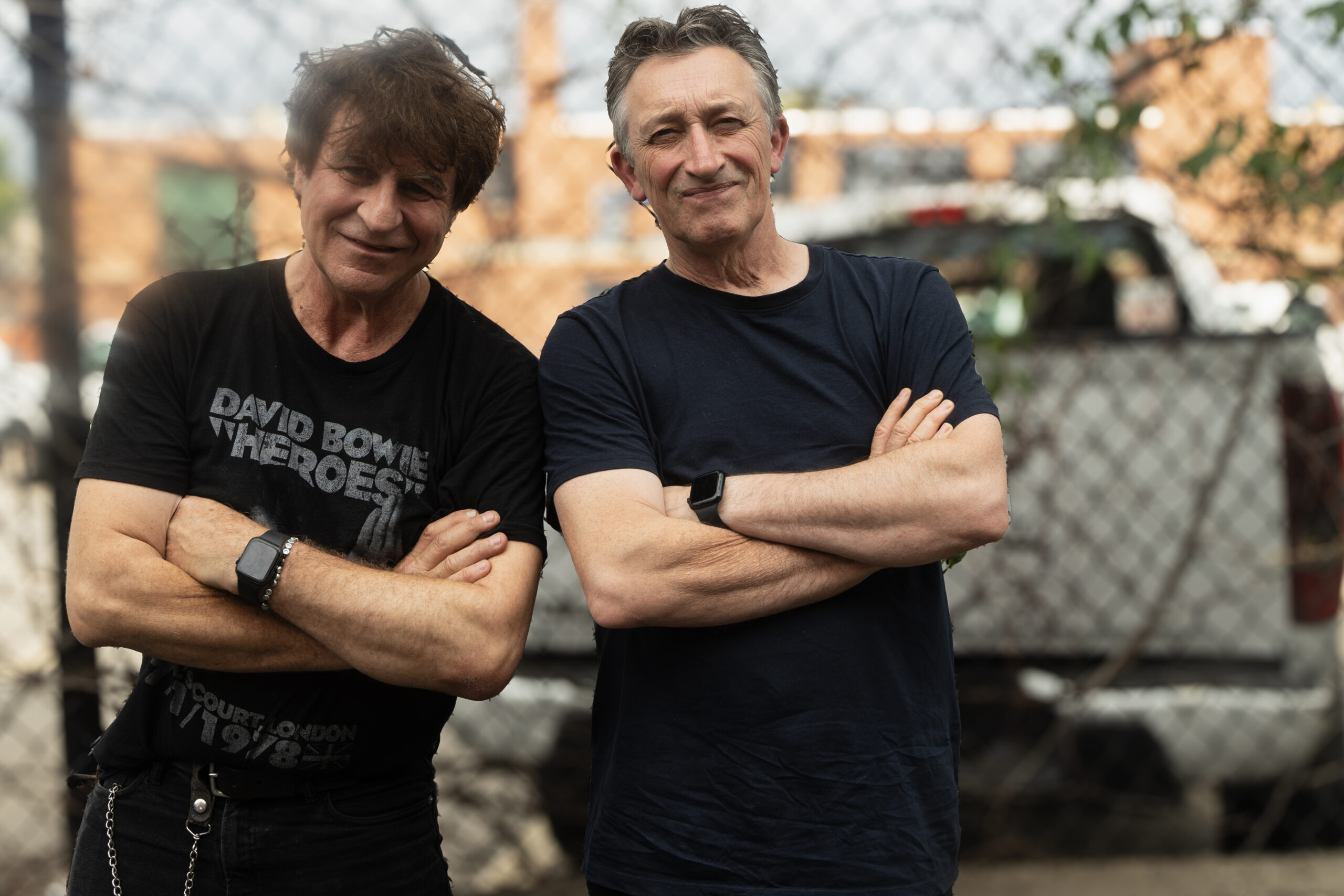
The Chameleons recently visited Black Cat in DC to play their album Strange Times in full. The band today consists of frontman Mark Burgess (vocals, bass) and founding guitarist Reg Smithies, who have reunited to give new life to the band. The Chameleons also include Todd Demma (drums), Stephen Rice (drums, guitar), and Danny Ashberry (keyboards), who all joined Mark in 2021.
On August 17, The Chameleons very nearly sold out the Black Cat for their Strange Times Tour 2024. Mark and the band were very much in the zone, and they played an engrossing and exciting set of 11 songs from Strange Times, followed by another six songs in an encore that included favorites from debut album Script of the Bridge and new single “Where Are You?”
Prior to the show, Parklife DC’s Mickey McCarter sat down with Mark Burgess of The Chameleons to ask him about the enduring success of Strange Times, the band’s upcoming new album, and his songwriting methods and outlook.
This interview has been edited for length and clarity.
Mickey McCarter: I want to start by saying the last time that I saw you perform, you were at the Darker Waves Festival in Huntington Beach, California, and that was a really great set. I was pleasantly surprised you guys were part of the bill.
Mark Burgess: They made us enough that we couldn’t refuse!
MM: Did you enjoy the experience?
MB: Yeah, very much so, actually. I don’t normally like doing them because of the franticness of it and the way that they’re geared to get you on and off stage as fast as possible. But I have to say, that was probably one of the most enjoyable festivals ever. They were incredibly professional, incredibly organized. It was so easy. They had a really good system of line-checking the bands. So, we were ready to go. It was no stress. They had these taxis to take us from state to stage. The facilities were great. It was really enjoyable. The lineup was incredible! The B-52s! I saw Devo, and I watched New Order. It was just really good.
MM: You would do that sort of thing again?
MB: I would definitely do it again, yeah.
MM: I am excited too that you’ve got this new album coming out. I did some research, and I didn’t really see anything about the story of how this new album came about. I know you and Reg Smithies connected during the pandemic.
MB: Reg kind of drifted in. I was touring my solo act as Chameleons Vox, and we started playing together, and we evolved from there. He realized, A, that he wanted to come back to it, because he’d left music to bring up his family. His kids have grown up now, and he felt ready to come back to it. He started hanging out with us, and he saw how uncomplicated it all was. There was no baggage anymore. Everyone got on really well with each other. And it was very relaxed. And he really got into it.
Then Reg just made the decision that he wanted to come back full-time, which was the perfect time for it. But then it wasn’t, because the pandemic happened, and we had to put it all on hold til everything got back up and running. But that was fortuitous in its way, because by the time that was over, we had all the right elements in place to take the music forward. It worked out naturally, right, even though it seemed as if obstacles were being placed in front of us. What was actually happening was we were being delayed until the time was right.
Stream “Swamp Thing” by The Chameleons on Spotify:
MM: Did you guys write over the pandemic?
MB: We started to. We didn’t really get that far with it. But we started to do that. We couldn’t actually get together. In England, in particular at that time, we were in a complete lockdown for months. We couldn’t leave the house, so working together was very problematic.
Then, when we did get together, I expected it to take a lot longer. I thought we were going to be there for months working stuff out. And within weeks, it all came together. It just came together really fast. And quite easil. It wasn’t difficult at all.
MM: To be clear, you and Reg started writing together, and then you said, “hey, maybe we have an album here…?”
MB: Well, no. I’d been writing some songs anyway that I didn’t really know how to execute. I was writing them, and I’m thinking, “well, I know that the songs are here. But is it really right for something like The Chameleons?” I couldn’t tell.
And then I played them, and everybody agreed, “We could do that.” And then with everybody’s input, we put it down. Then Reg would have an idea, and he’d play, and I’d hear something in it. And that’s what happened with the single, “Where Are You?” I heard the riff; he had the riff on a loop. It was a really catchy, interesting guitar riff. And so I saw it as the basis of the single. I put my contribution into it to make it a complete arrangement. And we’ve got other things that we’re waiting to work on as well.
Reg is full of ideas, and they really grab you. But they are also very unusual. There’s nothing typical about anything he does. “Tears” [from Strange Times] is a great example of that. I heard the song immediately when he played me the riff for “Tears.” I knew where it should go with the arrangements and the breaks and the choruses. It took us minutes to write that. That’s the cool thing about writing with him. We seem to complement each other in that way.
But in the old days of The Chameleons, I couldn’t bing the song to them and play it and ask them to help me out. That was discouraged. The legacy stuff was all jammed out. Dave [Fielding] was pretty much in the driving seat for most of that. And he didn’t want people bringing complete arrangements. And so, I still relish doing so many side things. Because I could bring in my songs. But now, I’ve been given that latitude, and we can go with something if they like it.
When we were developing the new EP, we were going through our hard drives and looking for ideas. I had this song I’d done called “Forever.” I played it for the band, and they said, “That’s got to go on the album!” We didn’t do much more to it. I maybe wouldn’t have done that. So, that’s why it’s good to have different perspectives in the group. They think of things that you wouldn’t consider.
Watch the official music video for “Where Are You?” by The Chameleons on YouTube:
MM: I understand. When does the new full-length album — Arctic Moon — come out? Later this year?
MB: We were supposed to reconvene in July to finish it. And then I had some personal issues that I had to tackle. And it turned out that it was the right thing to do for everyone else. Because we had been on the road by that time for a couple of months. And, for example, Todd [Demma] had not seen his family for a couple of months. Stephen [Rice] just had a baby with his partner, and he was eager to take a break. So in the end, rather than go straight into the studio, we took a hiatus in July. So, we’re still halfway through it. But I’m eager to finish it. We’re all really excited by what we’re doing. It’s very different from anything we’ve done before.
It is a little bit more mature, which is expected. We’re not going to write the same way we wrote when we were 20 years old. Sorry, people, but we’re not. When you look at our legacy songs, there is a young person’s vitality that went into that. We still think it’s interesting and deep enough, and it’s definitely still us. It’s still very much Chameleons music, but it’s more mature. So, I’m hoping that people will take to it. I’m really happy for the most part with the reaction to the single.
MM: You’re sitting here with me wearing a David Bowie t-shirt, and I cannot help but think that David Bowie would have said and done the same thing.
MB: I took a leaf out of David Bowie’s book — because I was doing exactly what he was saying he shouldn’t do for a long time, which was concerning myself with the audience. I was thinking, “Well, if I do this, would it sit right with me?” And it’s completely the wrong way of going about it. David said in an interview that you can’t get too comfortable if the water starts to feel a little deep. It’s a good thing if you’re not on solid ground. And that’s how it should be. Playing it safe is artistically crippling, and I agree with him.
And it took Reg to put me right. He said, “When did we ever do that?” And when I thought about it, he was right. We never did that. When we were making this music and when we were establishing this band, we were pleasing ourselves first and foremost. We weren’t thinking about the audiences that would come to see us and what they might think. So, I got over that, and I’m glad that I did. Now, there’s a maturity and yet an awesome element of fun.
Obviously, the popularity of it will determine whether we’re not going to get to make another. But that’s always been the case. Even after Script of the Bridge, I said, “maybe we’ll get to make another album.” I didn’t know if we were going to make a second one. It wasn’t a glib remark. It was being honest. Perhaps we’ll make another. Who knows?
MM: “Where Are You?” is a really good song, and I thought it was appropriate that it ended up with Metropolis Records. It seems like a good label for you right now.
You know, where are you? I think that’s a really good song. And, you know, I thought it was kind of appropriate that it ended up on Metropolis. It seemed like a good label, like for you.
MB: It’s tinged with tragedy because the guy that signed us was David Hickman, the guy who established the label. He was a great admirer of ours. And I was doing some acoustic shows a few years ago with Steven in America, and he came to the Philadelphia show. That proved to be quite poignant. We were performing Second Skin. I talked to him about the songs in terms of where they came from, how they developed. And I was talking about “Second Skin” in particular, which has a very deep metaphysical theme about it. He responded very strongly to the stories I shared because he had a great affinity with that song. And we got excited about doing something with Metropolis. I was looking forward to a new record, and we continued on our tour. Then David died suddenly. He was the visionary of the label. He was the driving force, and now he was gone. The label was in shock for a while. Gail, who now runs the label, was Dave’s partner. They had some grief to deal with, and it was a difficult time.
But I have to say, they’ve done a magnificent job. They put a lot of trust in us. They initially weren’t going to release a vinyl record, but we said we should do it. And they trusted us, and it’s been really, really nice. They also accepted the cover, which was a departure for us. There was very little time to get it together, because we wanted it out in May. And so we needed the artwork “yesterday” for that, and it wasn’t enough time for Reg to do something for it.
So, I chose a photographer — that I’m a fan of — who is based in Berlin. And that was quite provocative. A lot of people saw it as a very sexist sleeve. But it’s ridiculous because she’s photographing herself as a silhouette. If you see anything sexist in that, that says more about you than it says about the photographer.She’s photographing herself as a silhouette. And what struck me was the symbiosis of the curves of the female form with the curves of the Les Paul guitar. The sex is in the guitar, not in the silhouette.
It’s important that we put across that this is a new Chameleons. This is not the ’80s sound. That’s going to polarize the audience, and it did polarize some to an extent. I expected that, and that’s fair enough. I’ve had that with bands myself where they’ve evolved, and I’ve not particularly gone with it. It’s natural, and it’s fine. How many incarnations of The Fall did we see one the last 30 years? Every time they put a record out, it was a different band almost! I loved some of that, but you can’t like everything. I’m excited about doing something fresh.
MM: Well, you are touring Strange Times, and so I would like to ask you a bit about Strange Times. It has turned out to be such an influential record. Did you imagine that it would be so, and that people would love “Swamp Thing” so much in particular?
MB: I did at the time view it as a very special record. From what I contribute to the music, I felt it had opened up to that point where it had been the best work I’d ever done. I really pushed myself on it. And I did very little preliminary writing for it. I did most of it on the mic. I had loose ideas and loose themes, but it didn’t coagulate until I was actually doing the performances, which I thought was really spontaneous. I was doing crazy things at the time. For perhaps the first two weeks of that recording session, I was fasting completely. I fasted for two weeks. I took nothing but water, but I was writing and working.The first couple of days, I felt weakened, but then after about the third, I was energized because I was getting all these toxins out of my body. I stopped smoking.
For two weeks, I didn’t eat at all. And then that’s when I became vegetarian. So there was that element as well. It put me on a different creative level psychologically. I was bursting with ideas. For me, when it was finished and I stood back from it, I’m thinking, “That is the best record I’ve made.” People will always go to the Script of Bridge, and I understand why.
But for me as a writer, I was so happy with Strange Times because there were songs on that record that were a complete departure for a post-punk band. These were songs that were completely different — songs like “Childhood” or “Serioucity” or even “Caution.” For me, it told us that we were mature. Had we gone on to make a fourth album by The Chameleons then, it would have been our masterpiece. But it wasn’t to be.
Did I expect to be playing Strange Times 40 years later? No, I didn’t. But, you know, America took to it more than anywhere else. I was quite dejected coming back from the ’87 Strange Times tour of the United States due to the lack of respect we were getting from the British media. There were no mentions of The Chameleons in the press, and I wondered, “Why are we staying here?” If we want to establish ourselves, we ought to do what The Police did and move across the Atlantic.” That idea took hold for a while. The New York Times published their review of Strange Times and compared it to Revolver. We couldn’t even get the record reviewed in the United Kingdom.
And we almost did come here. We were planning to come here to make the fourth album, and we were going to make it in the United States. And then we lost our mentor, Tony Fletcher. It all went to shit after that.
And so, I had a very strong sense that Strange Times was a special record. It always has been for me. There were things I would have done differently. I believe we perform it and play it better now than we did then. There are legacy songs like when we revisited “Things I Wish I’d Said,” which was originally featured on the original Peel Session but in a comparatively unfinished form. Then, we weren’t mature enough to finish it and do it justice, and now we are. So that’s what we have done.
Watch The Chameleons play “Things I Wish I’d Said” live in 1982 via YouTube:
MM: I want to say, from my perspective, that I love hearing about The Chameleons coming to America and finding an audience. When I was a kid, with all of the stuff coming from England, we were amazed that there was interesting music that was speaking to us. Here are The Chameleons, and here is Joy Division, and here are The Smiths. We didn’t imagine you all hung out together or anything, but you all seemed to have special insights coming from Manchester, which seemed like this awesome but foreign place. Us Gen X kids took to it very quickly.
MB: Right, but we were very much products of the ’60s and the ’70s. So was Morrissey. So was Ian Curtis. In Ian, I saw the Bowie “Man Who Sold the World” period. And for post-punk, we wanted to keep everything simplistic. We wanted to get away from the more proggy stuff of the time. So the music then reflected that. Now unfettered by that, we can really truly celebrate it. It doesn’t matter anymore, so much. It’s been good to shed the past and to start celebrating the influences that made us buy records in the first place. And that was all the mid-’60s, early ’70s really.
MM: You don’t come to DC very often in recent years, and so it’s exciting to see you at Black Cat.
MB: Ironically, DC was the very first place the Chameleons ever played in America. We played the original 930 Club here in 1984. And that was the first time that we’d ever been to America. We came straight here and we played, as I said, the original 930 Club.
**
Follow The Chameleons on Facebook for more music and tourdates!
Here are some photos of The Chameleons performing at Black Cat on August 17, 2024. All pictures by Mickey McCarter.






















Thanks for giving great exposure to an amazing band that I’ve loved for 40 years! In Shreds, the first single they put out, is still an all time favorite. With Reg back onstage, the band performs at a whole new level.
Good to see a pic of Mark and Reg looking happy together, and was interesting to read that the Arctic Moon album may be delayed slightly. Hope it’s out before the UK tour come December though.